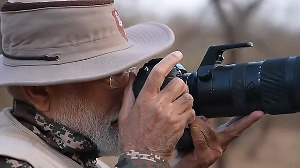The Supreme Court on Thursday referred to a seven-judge Bench the constitutional questions pertaining to freedom of press arising from the arrest warrants issued last year by the Tamil Nadu assembly speaker against the editor and senior journalists of The Hindu newspaper.
A five-judge Bench comprising Chief Justice R C Lahoti, Justice B N Agrawal, Justice H K Sema, Justice G P Mathur and Justice P K Balasubramanyam took the decision following submissions that the SC had given conflicting rulings on the issue of freedom of press.
| |||||||||||
Appearing for the Centre, Solicitor General G E Vahanvati said it was a sensitive issue and as the cause of action did not survive, there was no need for the SC to go into the issue.
The SC asked Vahanvati as to why Parliament was not framing a law on this issue and as to why it had to "poke its nose" into the fight between the legislature and media.
When Salve submitted that the press' role was very significant and that it had been recognised as the fourth pillar of democracy, the Bench observed, "Protection available under Article 19 (Right to Free Speech) should be available only to those who deserve it. Should we not have a responsible press?"
Salve submitted that the law on this issue had changed all over the world and even remarks expunged by the speaker should be allowed to be published by the media if they were of great significance to the public.
Salve pointed out that a five-judge Bench of the SC had, in 1954, ruled that privileges of the House under Article 194(3) of the Constitution were subject to the fundamental rights.
He said in 1965, a seven-judge Bench in another case had ruled that though the privileges of the House were subject to the right to life guaranteed under Article 21, the right to free speech under Article 19 could not come in the way of the House deciding an issue pertaining to its privileges.
Noticing the conflict between the two rulings, the Bench referred the matter to a seven-judge constitution Bench.






 © 2025
© 2025